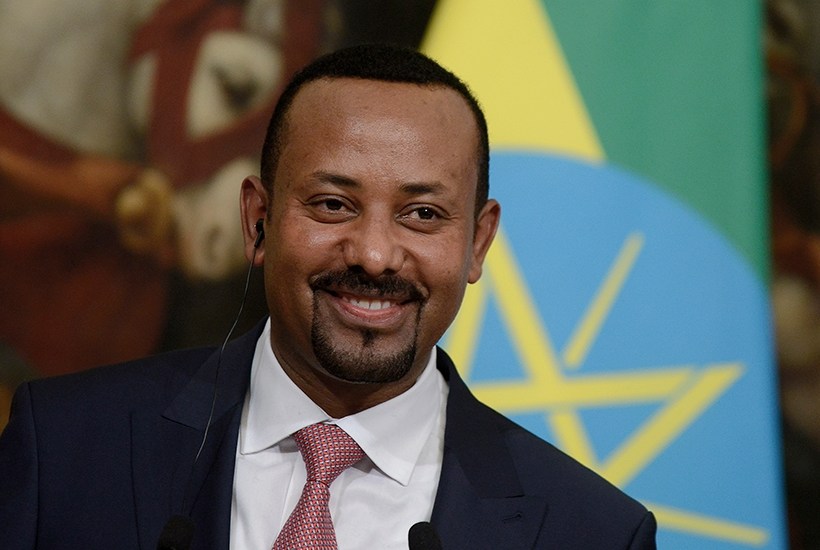I suspect that there are no people in the world quite so right-on as the Nobel prize committee members. A bunch of affirmative-action hand-wringing Scandies, desperate to prove that they are woker than thou. This mindset brought the Nobel peace prize to Barack Obama before he had actually done anything, if you remember. He later brought peace to nowhere. The scarcely less risible award of the literature prize to Bob Dylan followed shortly after, presumably for lines such as: ‘Twas in another lifetime, one of toil and blood / When blackness was a virtue and the road was full of mud.’ Bob’s award reminded me of the BBC turning paroxysms in an effort to be ‘hip’ when Lou Reed shuffled off his mortal coil.
But the best of the recent awards must be the peace bauble bestowed upon Mr Abiy Ahmed, Prime Minister of Ethiopia, in 2019. The full citation reads: ‘For his efforts to achieve peace and international co–operation, and in particular for his decisive initiative to resolve the border conflict with neighbouring Eritrea.’ One assumes that Abiy was really honoured because by and large Africans don’t win many Nobel prizes, comparatively, and the jury wanted to get away from this corrosive white-saviour complex. For the liberals, there is always one country which is a ‘source of hope’ in Africa, and in 2019 it was the basket case, Ethiopia. Many other countries have occupied that cherished position for a year or so, before descending back into a hell so complete that even the liberals can’t pretend everything’s tickety-boo. It was Uganda once, in a brief interim between the usual grotesque and brutal mismanagement. South Sudan and Tanzania have both been held aloft, too. And of course South Africa. Not any more. Not any more for Ethiopia and Mr Abiy, either.
Since winning that award, for having brokered a temporary peace deal with the maniacs of the Tigray People’s Liberation Front, Abiy has not entirely administered his country with the benevolence one might expect from a Nobel peace prize winner. He decided to postpone (i.e. cancel) scheduled elections last year, much to the chagrin of the opposition — and indeed to the fury of the TPLF, which recommenced hostilities. Abiy has prosecuted this war against the north of his country with a ferocity which would have been commended by some of his predecessors. The Tigrayan people, meanwhile, are starving. Abiy’s soldiers have massacred civilians and raped a lot of women, something which Mr Abiy thinks is absolutely hilarious, as evidenced by the jokes he makes about historic crimes in the region. In a speech to Ethiopian ambassadors he quipped: ‘It’s probably wrong to say this, but: those who went to Adwa to fight didn’t just go and come back. Each of them had about ten kids.’ [Loud laughter from the audience and much applause.] What a mensch! Ethiopia is now facing sanctions from the civilised world, but none of this has stopped Abiy from turning off the internet to quell dissent within his country, nor -prevented him from having political opponents detained or done away with.
I like to keep an eye on what’s happening in Ethiopia because the country serves as a riposte to the deluded, or lying, progressives who insist that Africa’s problems are either largely or entirely the consequence of western colonialism. Ethiopia suffers from broadly the same malaise as the countries in Africa which surround it. Appalling and often brutal governance, corruption, periods of starvation, the lack of a vibrant entrepreneurial class, riven by tribalism and semi-perpetual warfare, and in the bottom 25 of all countries in the world as ranked by the United Nations’s Human Development Index. But here’s the point of course — Ethiopia was never colonised: it has proudly and bravely made its own way in the world with little outside interference. True, Benito Mussolini ill-advisedly invaded the place in 1935 — but that interregnum lasted precisely five years and is not usually considered to count when we are examining the effects of colonisation. It was never a proper colony, then — and yet it displays exactly the same problems as those countries nearby, such as Sudan and Somalia, which were colonised.
There is one other country in Africa which stayed independent: Liberia, an independent republic set up in 1822 for freed slaves. And yet once again, there is Liberia, suffering exactly the same problems as those previously colonised countries which surround it. Liberia and Ethiopia, at numbers 175 and 173 on the UN’s Human Development Index. Never colonised. This by itself is sufficient to rebut the absurd notion that colonialism is primarily or completely responsible for Africa’s ills. But you could go further and point the liberal interlocutor towards Singapore: a dominion of the British Empire for 160 years and now a stable (perhaps too stable for our liking) democracy, one of the richest countries in the world and ranked 11th on the UN’s HDI. Colonialism wasn’t terribly hurtful to Singapore in the end. For sure, Singapore is more of a city than a state, and very conveniently positioned trade-wise too. But that merely suggests that geography has something to do with how prosperous a country might become and it’s not all about evil whitey. In which case proceed northwards, across the Johor Strait, into Malaysia. A British colony for 140 years and in the hands of the Dutch before that. And yet it is a thriving middle-income country, comfortably berthed within the top third according to the HDI.
All of this stuff suggests very strongly to me that, objectively, colonialism is not remotely the cause of Africa’s problems, given that African countries which were not colonised suffer exactly the same depredations as those which were, and that colonised countries outside Africa (to which we might add Malta) seem to be doing perfectly well. But even though these are clear and patent facts, they cut no ice with the sort of people who gave Abiy Ahmed a Nobel prize.
Got something to add? Join the discussion and comment below.
Get 10 issues for just $10
Subscribe to The Spectator Australia today for the next 10 magazine issues, plus full online access, for just $10.
You might disagree with half of it, but you’ll enjoy reading all of it. Try your first month for free, then just $2 a week for the remainder of your first year.















Comments
Don't miss out
Join the conversation with other Spectator Australia readers. Subscribe to leave a comment.
SUBSCRIBEAlready a subscriber? Log in